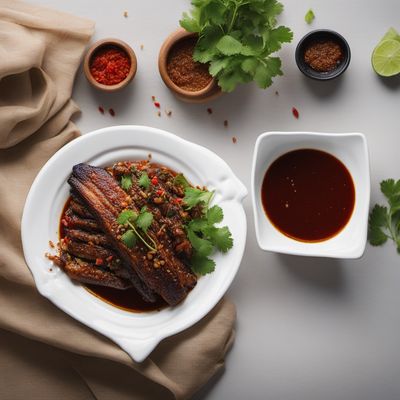
Ingredient
Eel, australian
The Ocean's Delicacy
Australian eel is characterized by its smooth, slimy skin and elongated body. It has a rich, buttery flavor with a hint of sweetness and a tender, flaky texture. Its appearance ranges from dark brown to grayish-black, and it is often used in dishes like sushi, grilled or smoked eel, and traditional Asian stews.
Origins and history
Australian eel has a long history of consumption in Indigenous Australian communities, where it was an important food source. It is also highly regarded in Japanese cuisine, where it is commonly used in sushi and other traditional dishes. The eel is sourced from the coastal waters of Australia and is known for its sustainability and high quality.
Nutritional information
Australian eel is a good source of protein, omega-3 fatty acids, vitamin D, and various minerals. It is relatively low in calories, with approximately 184 calories per 100 grams.
Allergens
Some individuals may be allergic to eel, so caution should be exercised when consuming this ingredient.
How to select
When selecting Australian eel, look for firm, shiny skin with a slimy texture. The flesh should be moist and have a fresh, clean smell. Avoid eels with dull or dry skin, as they may be less fresh.
Storage recommendations
To maintain the freshness of Australian eel, store it in the refrigerator at a temperature between 32°F and 38°F (0°C and 3°C). Keep it wrapped in plastic or place it in a sealed container to prevent any odors from permeating the flesh. Use it within 1-2 days of purchase for the best quality.
How to produce
Australian eel is typically sourced from the wild, but it can also be farmed. To produce eel, create a suitable aquatic environment with proper water quality and temperature. Eels can be raised in tanks or ponds, and they require a diet of live or frozen food such as fish, shrimp, or worms.
Preparation tips
Australian eel can be prepared in various ways, including grilling, smoking, or pan-frying. It is commonly used in sushi, where it is served as nigiri or in rolls. It can also be marinated, braised, or added to stews and soups for a rich, flavorful addition. When grilling or smoking eel, brush it with a glaze or sauce to enhance its natural flavors.
Culinary uses
Australian eel is commonly used in sushi, grilled or smoked eel dishes, and traditional Asian stews. It can also be added to pasta, salads, or served as a standalone dish. Its rich flavor and tender texture make it a versatile ingredient in various cuisines.
Availability
Australian eel is commonly available in Australia, Japan, and other Asian countries. It can also be found in select seafood markets or specialty stores around the world.


